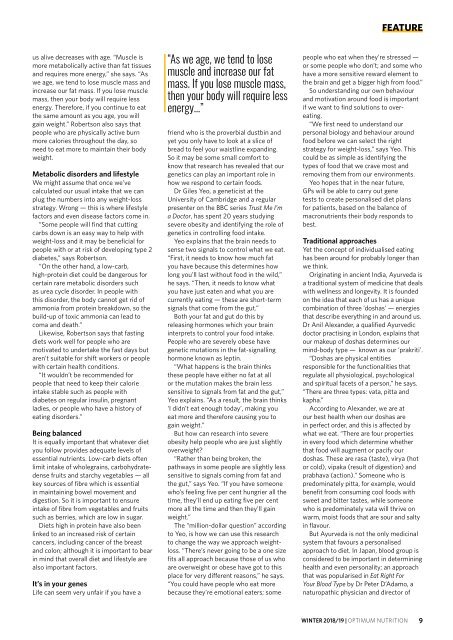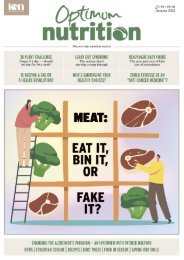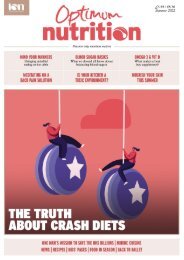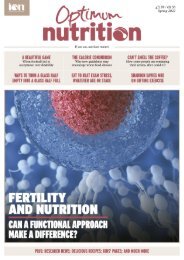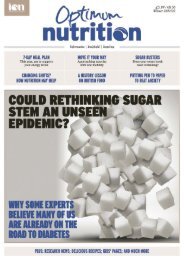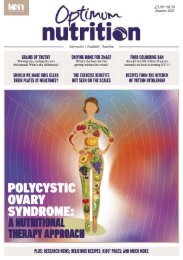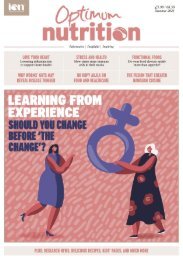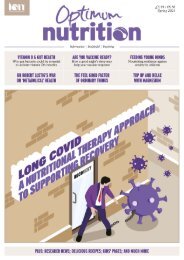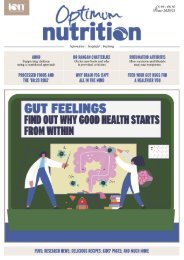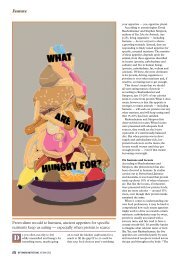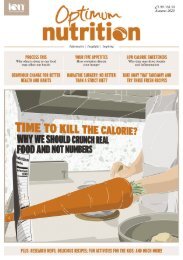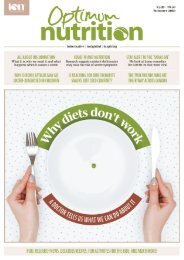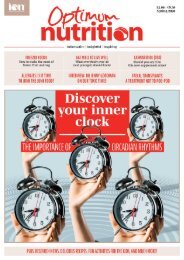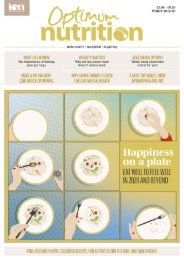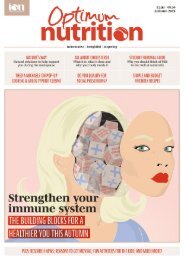One size diets
It’s big bucks time for the weight-loss industry again, so Alice Ball looks at whether, when it comes to trying to watch our weight, one size can really fit all
It’s big bucks time for the weight-loss industry again, so Alice Ball looks at whether, when it comes to trying to watch our weight, one size can really fit all
You also want an ePaper? Increase the reach of your titles
YUMPU automatically turns print PDFs into web optimized ePapers that Google loves.
FEATURE<br />
us alive decreases with age. “Muscle is<br />
more metabolically active than fat tissues<br />
and requires more energy,” she says. “As<br />
we age, we tend to lose muscle mass and<br />
increase our fat mass. If you lose muscle<br />
mass, then your body will require less<br />
energy. Therefore, if you continue to eat<br />
the same amount as you age, you will<br />
gain weight.” Robertson also says that<br />
people who are physically active burn<br />
more calories throughout the day, so<br />
need to eat more to maintain their body<br />
weight.<br />
Metabolic disorders and lifestyle<br />
We might assume that once we’ve<br />
calculated our usual intake that we can<br />
plug the numbers into any weight-loss<br />
strategy. Wrong — this is where lifestyle<br />
factors and even disease factors come in.<br />
“Some people will find that cutting<br />
carbs down is an easy way to help with<br />
weight-loss and it may be beneficial for<br />
people with or at risk of developing type 2<br />
diabetes,” says Robertson.<br />
“On the other hand, a low-carb,<br />
high-protein diet could be dangerous for<br />
certain rare metabolic disorders such<br />
as urea cycle disorder. In people with<br />
this disorder, the body cannot get rid of<br />
ammonia from protein breakdown, so the<br />
build-up of toxic ammonia can lead to<br />
coma and death.”<br />
Likewise, Robertson says that fasting<br />
<strong>diets</strong> work well for people who are<br />
motivated to undertake the fast days but<br />
aren’t suitable for shift workers or people<br />
with certain health conditions.<br />
“It wouldn’t be recommended for<br />
people that need to keep their calorie<br />
intake stable such as people with<br />
diabetes on regular insulin, pregnant<br />
ladies, or people who have a history of<br />
eating disorders.”<br />
Being balanced<br />
It is equally important that whatever diet<br />
you follow provides adequate levels of<br />
essential nutrients. Low-carb <strong>diets</strong> often<br />
limit intake of wholegrains, carbohydratedense<br />
fruits and starchy vegetables — all<br />
key sources of fibre which is essential<br />
in maintaining bowel movement and<br />
digestion. So it is important to ensure<br />
intake of fibre from vegetables and fruits<br />
such as berries, which are low in sugar.<br />
Diets high in protein have also been<br />
linked to an increased risk of certain<br />
cancers, including cancer of the breast<br />
and colon; although it is important to bear<br />
in mind that overall diet and lifestyle are<br />
also important factors.<br />
It’s in your genes<br />
Life can seem very unfair if you have a<br />
“As we age, we tend to lose<br />
muscle and increase our fat<br />
mass. If you lose muscle mass,<br />
then your body will require less<br />
energy...”<br />
friend who is the proverbial dustbin and<br />
yet you only have to look at a slice of<br />
bread to feel your waistline expanding.<br />
So it may be some small comfort to<br />
know that research has revealed that our<br />
genetics can play an important role in<br />
how we respond to certain foods.<br />
Dr Giles Yeo, a geneticist at the<br />
University of Cambridge and a regular<br />
presenter on the BBC series Trust Me I’m<br />
a Doctor, has spent 20 years studying<br />
severe obesity and identifying the role of<br />
genetics in controlling food intake.<br />
Yeo explains that the brain needs to<br />
sense two signals to control what we eat.<br />
“First, it needs to know how much fat<br />
you have because this determines how<br />
long you’ll last without food in the wild,”<br />
he says. “Then, it needs to know what<br />
you have just eaten and what you are<br />
currently eating — these are short-term<br />
signals that come from the gut.”<br />
Both your fat and gut do this by<br />
releasing hormones which your brain<br />
interprets to control your food intake.<br />
People who are severely obese have<br />
genetic mutations in the fat-signalling<br />
hormone known as leptin.<br />
“What happens is the brain thinks<br />
these people have either no fat at all<br />
or the mutation makes the brain less<br />
sensitive to signals from fat and the gut,”<br />
Yeo explains. “As a result, the brain thinks<br />
‘I didn’t eat enough today’, making you<br />
eat more and therefore causing you to<br />
gain weight.”<br />
But how can research into severe<br />
obesity help people who are just slightly<br />
overweight?<br />
“Rather than being broken, the<br />
pathways in some people are slightly less<br />
sensitive to signals coming from fat and<br />
the gut,” says Yeo. “If you have someone<br />
who’s feeling five per cent hungrier all the<br />
time, they’ll end up eating five per cent<br />
more all the time and then they’ll gain<br />
weight.”<br />
The “million-dollar question” according<br />
to Yeo, is how we can use this research<br />
to change the way we approach weightloss.<br />
“There’s never going to be a one <strong>size</strong><br />
fits all approach because those of us who<br />
are overweight or obese have got to this<br />
place for very different reasons,” he says.<br />
“You could have people who eat more<br />
because they’re emotional eaters; some<br />
people who eat when they’re stressed —<br />
or some people who don’t; and some who<br />
have a more sensitive reward element to<br />
the brain and get a bigger high from food.”<br />
So understanding our own behaviour<br />
and motivation around food is important<br />
if we want to find solutions to overeating.<br />
“We first need to understand our<br />
personal biology and behaviour around<br />
food before we can select the right<br />
strategy for weight-loss,” says Yeo. This<br />
could be as simple as identifying the<br />
types of food that we crave most and<br />
removing them from our environments.<br />
Yeo hopes that in the near future,<br />
GPs will be able to carry out gene<br />
tests to create personalised diet plans<br />
for patients, based on the balance of<br />
macronutrients their body responds to<br />
best.<br />
Traditional approaches<br />
Yet the concept of individualised eating<br />
has been around for probably longer than<br />
we think.<br />
Originating in ancient India, Ayurveda is<br />
a traditional system of medicine that deals<br />
with wellness and longevity. It is founded<br />
on the idea that each of us has a unique<br />
combination of three ‘doshas’ — energies<br />
that describe everything in and around us.<br />
Dr Anil Alexander, a qualified Ayurvedic<br />
doctor practising in London, explains that<br />
our makeup of doshas determines our<br />
mind-body type — known as our ‘prakriti’.<br />
“Doshas are physical entities<br />
responsible for the functionalities that<br />
regulate all physiological, psychological<br />
and spiritual facets of a person,” he says.<br />
“There are three types: vata, pitta and<br />
kapha.”<br />
According to Alexander, we are at<br />
our best health when our doshas are<br />
in perfect order, and this is affected by<br />
what we eat. “There are four properties<br />
in every food which determine whether<br />
that food will augment or pacify our<br />
doshas. These are rasa (taste), virya (hot<br />
or cold), vipaka (result of digestion) and<br />
prabhava (action).” Someone who is<br />
predominately pitta, for example, would<br />
benefit from consuming cool foods with<br />
sweet and bitter tastes, while someone<br />
who is predominately vata will thrive on<br />
warm, moist foods that are sour and salty<br />
in flavour.<br />
But Ayurveda is not the only medicinal<br />
system that favours a personalised<br />
approach to diet. In Japan, blood group is<br />
considered to be important in determining<br />
health and even personality; an approach<br />
that was popularised in Eat Right For<br />
Your Blood Type by Dr Peter D’Adamo, a<br />
naturopathic physician and director of<br />
WINTER 2018/19 | OPTIMUM NUTRITION<br />
9


